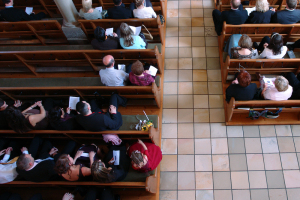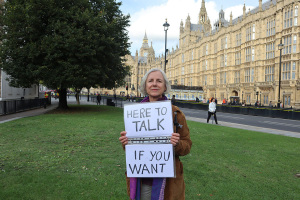Christian man wins right to correct religion on ID card after being victim of falsified conversion to Islam

LAHORE, Pakistan — A judge in Pakistan has overturned a verdict that denied a Christian man’s effort to correct his name and religion on his national identity card after he was a victim of fake conversion to Islam, his attorney said.
Ahmad Saeed, additional district judge of Pattoki Tehsil, Kasur District, Punjab Province, on Nov. 16 overturned the verdict of Pattoki Civil Judge Mian Usman Tariq, who had ruled that 24-year-old Sufyan Masih could not revert to Christianity after “converting” to Islam, said the Christian’s attorney, Sumera Shafique.
Attorney Shafique said the civil judge had failed to assess the merits of her client’s case, apparently under fear of backlash from Islamists.
“The civil judge’s order was surprising, given the fact that none of the witnesses, including the cleric, Hafiz Abdul Waheed, who allegedly prepared the fake Islamic conversion certificate, and the two Muslim men who proclaimed to have witnessed the alleged conversion, appeared in court to record their statements despite repeated notices,” Shafique told Christian Daily International-Morning Star News.
Masih had definitively affirmed his Christian faith and had reiterated that declaration in his statement to the district judge, she added. He told the judge that Asif Ali, the brick kiln owner where Masih worked, had registered his name in the NADRA record as Muhammad Sufyan and his religion as Islam in a bid to enslave him.
“Being an illiterate person, Masih failed to read the form filled by the data entry operator on the directives of his employer,” Shafique said, noting that Masih had put his thumbprint on the form in ignorance.
In the May 18 ruling that has now been overturned, Judge Tariq had said, “Islam teaches that everyone is Muslim at birth, but [that] the parents and society cause one to deviate from the straight path. Therefore, when someone accepts Islam, he is considered to revert to his original condition.”
He added that, at the same time, Islam prohibits the use of force to convert anyone.
Shafique said the verdict overturning the May 18 ruling would be helpful in similar suits in civil courts.
“There are several cases in which the religion of Christians has been intentionally or mistakenly registered as Muslim in the national database,” she said. “A large number of the Christian population in Pakistan is unable to read or write, which is why they often tend to overlook the religion section in the form.”
NADRA officials are also responsible for the plight of impoverished petitioners as they do not follow the Standard Operating Procedure (SOP) in such matters, Shafique said. NADRA data operators are bound to obtain an undertaking from applicants at the time of registering their alleged conversion, but they are not implementing the procedure, she emphasized.
According to NADRA’s CNIC (Computerized National Identify Card) registration policy, any mistake by applicants to state their religion correctly due to illiteracy “may be handled in office fault category.” In Masih’s case, however, NADRA claimed that his name and religion could not be changed because at the time of registration he had verified his religion as Islam on the official form.
NADRA asserted that according to official policy, a Muslim cannot change his religious designation in the CNIC to any other religion, whereas people who convert to Islam from other faiths can get their CNICs amended.
Tehmina Arora, director of advocacy for Asia of legal advocacy group Alliance Defending Freedom (ADF) International, said the lower court’s failure to recognize Sufyan’s religious identity was a violation of both national and international laws.
“We welcome the Pattoki District court’s decision to protect Sufyan Masih’s right to live out his faith as a Christian,” Arora told Christian Daily International-Morning Star News. “This case highlights how Christians in Pakistan face discrimination at various levels.”
ADF International has supported Masih’s counsel in representing the impoverished Christian as well as raising awareness on this issue at global forums.
Elaborating on the challenges Christians face due to incorrect identity cards, Arora said that a simple typographical error in the religion category on the identity cards can be used to prevent Christians from freely practicing their faith.
“It also hinders their ability to apply for employment due to lack of valid identification documents,” she added.
Article 20 of Pakistan’s Constitution allows citizens the right to profess, practice and propagate their religion. This freedom is also assured in Article 27 of the International Covenant on Civil and Political Rights (ICCPR), which establishes that “in those states in which ethnic religious or linguistic minorities exist, people belonging to such minorities have the right in community with other members of their group to enjoy their own culture to profess and practice their own religion or use their own language.”
Similarly, the 1992 United Nations declaration further establishes that persons belonging to minority groups have the right to enjoy their own culture, to profess and practice their own religion and to use their own language in private and in public freely, without any interference or any form of discrimination and provides for the effective participation of minorities in cultural, religious, social, economic, and public life, as well as in decision, making processes on matters affecting them.
Apostasy is considered a sin punishable by death under most schools of Islamic jurisprudence. Although there is no specific law in Pakistan to deny Muslims their right to change religion, apostasy may be punished under Section 295-A of the country’s blasphemy statutes, which imposes up to two years of prison for “outraging the religious feelings of any class of citizens.”
Pakistan ranked seventh on Open Doors’ 2024 World Watch List of the most difficult places to be a Christian, as it was the previous year.
This article was originally published at Christian Daily International–Morning Star News





























